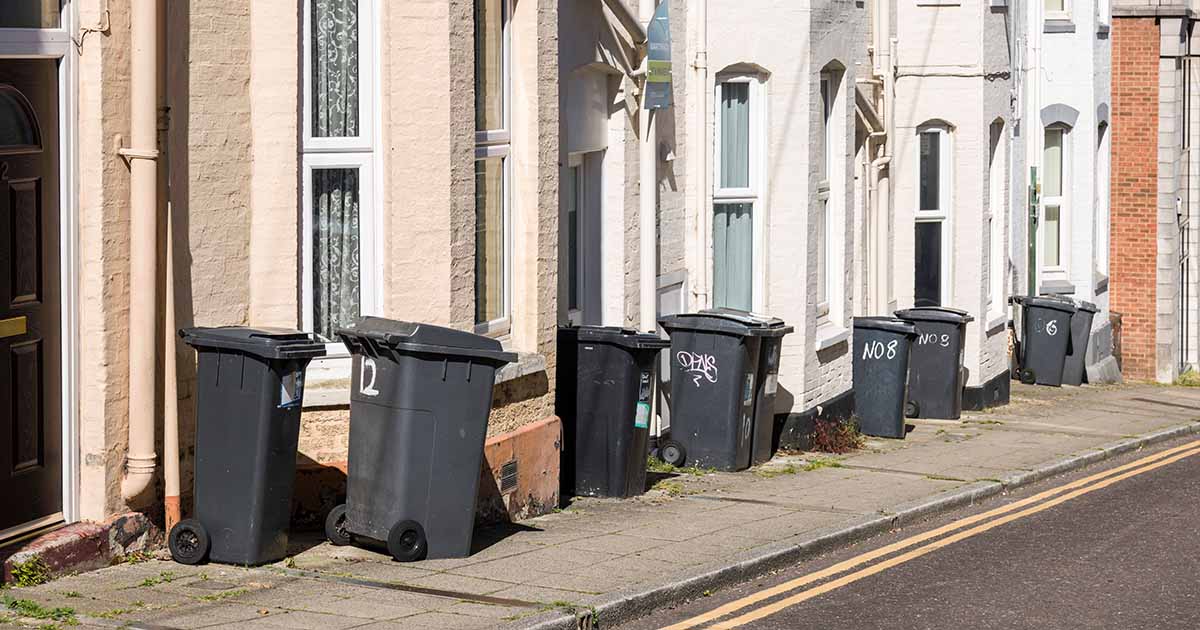Bournemouth Landfill Waste and Recycling Statistics 2025

Bournemouth produces one of the highest amounts of waste in the South West, ranking 6th out of 29 local authorities, according to the latest government data. But where does all that rubbish go? And how much of it is recycled - especially when it includes bulky furniture, commercial waste, or other items that can't go in your bin?
In this article, we take a closer look at Bournemouth’s latest waste and recycling statistics to see how waste is managed across the area, and where rubbish removal in Bournemouth fits into the bigger picture.
How much waste does Bournemouth produce?
Based on the latest government data for the year ending in March 2024, we found that:
- Bournemouth, Christchurch and Poole (BCP) Council collected 188,546 tonnes of waste that year – the same weight as 377,092 cows!
- 87% of this waste (164,019 tonnes) came from households.
- This works out as 413kg of household waste per person, including both recyclables and non-recyclables.
- On average, each household generated 507kg of black bin waste.
- The remaining 13% of waste (24,527 tonnes) came from non-household sources, such as businesses, factories, litter bins and fly-tipping.
- The total amount of waste collected by BCP council in the year ending March 2024 increased by just 0.18% compared to the previous year.
How does Bournemouth compare to other areas in the South West?
Based on the latest government statistics, BCP Council ranks 6th out of 29 local authorities in the South West for the total amount of waste collected.
- Its total waste output is almost identical to that of Dorset Council, which covers the rest of the county.
- In the year ending March 2024, Dorset Council collected 187,450 tonnes of waste, including 170,659 tonnes from households.
- This works out as 449kg of household waste per person, slightly higher than the figure for Bournemouth.
The table below shows the 10 local authorities in the South West that generated the most waste in the year ending March 2024, based on government data.
| Rank | Local Authority | Total waste collected (tonnes) |
|---|---|---|
| 1. | Devon County Council | 363,895 |
| 2. | Gloucestershire County Council | 288,847 |
| 3. | Cornwall Council | 269,608 |
| 4. | Somerset Council | 263,339 |
| 5. | Wiltshire Council | 227,649 |
| 6. | Bournemouth, Christchurch and Poole Council | 188,546 |
| 7. | Dorset Council | 187,450 |
| 8. | Plymouth City Council | 123,932 |
| 9. | South Gloucestershire Council | 121,875 |
| 10. | North Somerset Council | 97,451 |
Note: The latest figures do not include Bristol, due to incomplete reporting by Bristol City Council at the time these datasets were produced.
Bournemouth recycling statistics: How much of Bournemouth’s waste is recycled?
The latest government figures reveal how much waste is being recycled in Bournemouth – and how much still ends up in black bins.
- In the year ending March 2024, 85,628 tonnes of waste were recycled by BCP Council.
- This amounts to 45% of the total waste collected in the area.
- Bournemouth’s recycling rate is above the national average of 41%.
- However, it still means that 55% of waste is either incinerated or sent to a landfill.
Over the past five years, there has been a slow but steady downward trend in the percentage of waste recycled in Bournemouth, as seen in the graph below:
How does Bournemouth’s recycling rate compare to the rest of the UK?
Bournemouth performs well in some areas but falls behind in others when compared to local authorities across the South West and the rest of England:
- Bournemouth’s recycling rate of 45% is above the national average of 41%.
- Bournemouth ranks 41st out of 321 local authorities for the total volume of waste recycled, placing it in the top 13%
- For percentage of waste recycled, Bournemouth ranks 105th, putting it in the top third of councils nationwide.
- Looking across the South West, Bournemouth ranks 7th out of 29 local authorities for recycling volume.
- But when it comes to percentage recycled, it’s 19th in the region.
- Dorset Council leads the region, recycling more than 60% of its waste, while Exeter City Council ranks the lowest, at 29%.
The table below shows the 20 South West local authorities with the highest recycling rates in the year ending March 2024.
| Rank | Local Authority | Percentage of waste recycled |
|---|---|---|
| 1. | Dorset Council | 60% |
| 2. | East Devon District Council | 60% |
| 3. | North Somerset Council | 59% |
| 4. | Bath and North East Somerset Council | 58% |
| 5. | South Gloucestershire Council | 58% |
| 6. | Cotswold District Council | 57% |
| 7. | Stroud District Council | 56% |
| 8. | Somerset Council | 55% |
| 9. | Teignbridge District Council | 54% |
| 10. | Devon County Council | 54% |
| 11. | West Devon Borough Council | 54% |
| 12. | Forest of Dean District Council | 53% |
| 13. | Torridge District Council | 53% |
| 14. | Gloucestershire County Council | 53% |
| 15. | Mid Devon District Council | 53% |
| 16. | Tewkesbury Borough Council | 51% |
| 17. | Cheltenham Borough Council | 47% |
| 18. | Wiltshire Council | 46% |
| 19. | Bournemouth, Christchurch and Poole Council | 45% |
| 20. | South Hams District Council | 44% |
Bournemouth landfill waste statistics: How much rubbish is sent to landfill?
Bournemouth may recycle almost half of its waste, but a significant amount still ends up being buried or burned. Here’s what the data reveals:
- In the year ending March 2024, almost 10% (18,724 tonnes) went to landfill.
- Bournemouth has the 16th highest landfill rate among all local authorities in England.
- Within the South West, it has the second highest landfill rate, just behind Wiltshire, which sent 35,150 tonnes to landfill.
- By comparison, Dorset Council sent just 936 tonnes of waste to landfill in the same year.
- 40% of Bournemouth’s waste (76,004 tonnes) was sent for incineration.
- 13,377 tonnes of waste were rejected for recycling – likely due to contamination or unsuitable materials – and instead sent to landfill or incineration.
What’s being done to reduce waste sent to landfill in Bournemouth?
Given that Bournemouth is one of the highest waste-producing areas in the South West, more needs to be done to prevent recyclable materials from ending up in general waste bins. To help tackle this, Bournemouth, Christchurch and Poole Council is preparing to introduce a new waste collection system by 31 March 2026, in line with the government’s Simpler Recycling scheme.
The aim is to make recycling more consistent and accessible across England, and to reduce the amount of waste sent to landfill or incineration.
Under the new system, every household and flat in the BCP area will receive three separate waste containers for recycling, food waste and general rubbish. Weekly food waste collections will be introduced for all households, and recycling bags will be provided for homes that can’t store a full-size bin, with fortnightly collection.
Businesses will also need to separate their waste, and BCP Council will offer commercial collections for general waste, recycling and food waste to help meet the new legal requirements.
Looking ahead
While most of the council’s changes will be in place by March 2026, one key update will come slightly later. From March 2027, BCP Council plans to expand its kerbside recycling to include plastic film, including plastic bags, wrapping and pouches.
The delayed rollout is due to the need for upgraded recycling facilities. Sorting plastic films requires advanced technology, and investment is already underway to support this.
What can residents do to help?
Residents play a key role in improving Bournemouth’s recycling rates and reducing landfill waste. With the council’s updated collection system on the way, it will soon be easier to separate food waste and recyclables from general rubbish.
In the meantime, making smart everyday choices – like checking what can be recycled, rinsing containers to avoid contamination, and reusing or donating unwanted items – can make a big difference.
For larger or more complex waste, services such as HIPPO provide can help. HIPPO offers sustainable, hassle-free waste disposal in Bournemouth, making it easier to dispose of waste responsibly.
By working together, residents, businesses and the council can help reduce Bournemouth’s environmental impact and build a cleaner, greener future for the area.

